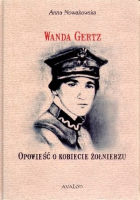Wanda Gertz
»From an early age my dream was to become a soldier in the Polish army. «
Wanda Gertz
Why I consider this woman to be an important person?
The World War I played a significant role in the emancipation of women. Women were forced to take the place of the men who were fighting at the front. In addition to working in factories, on trains and in hospitals, they were forced to guard the food shipments with weapons in their hands. For some women, it was not enough. They cut their hair, and bandaged their breasts and disguised in men’s clothes, with false documents, they set out to the front at the fight.
Wanda Gertz was one of 30 women who set off on the front of World War I in male disguise, but she was the only one who had the opportunity to test herself in combat with the enemy.
Biography
Wanda Gertz, daughter of Jan and Florentyna John, was born on April the 13th, 1896 in Warsaw. Family von Schliss Gertz arrived on the Polish territory in the eighteenth century from Saxony. They quickly felt at home here. Wanda's father was involved in the January Uprising. At her parents’ home the former insurgents met, recalling times conspiracy and fighting against the occupants. Wanda grew up in an atmosphere of insurgent stories told by her father and his friends. Already then, she dreamed of military service.
In 1913 she graduated from high school and went to study bookkeeping courses, at the same time she started working in a secret scouting organization. In addition to the scout team she participated in the Confederation of Polish. The purpose of this organization was to raise the spirit of independence and the promotion of shooting skills. Wanda’s task was to deliver proclamations to the houses and to sew haversacks for the soldiers of the Polish Military Organization.
After the outbreak of World War I (1914), as a member of the KP she took part in equipping the Warsaw Battalion. But was not satisfied with the work of an assistant. She was very disappointed when, in September the Battalion moved to the front and received a categorical ban on admission of women to the service line.
This did not discourage Wanda.
In a male disguise she volunteered to serve, under the name of Kazimierz Żuchowicz. Only a few people at the headquarters knew that Kazik Żuchowicz was a girl. During the period of 1914 - 1915 she served in the Pilsudski’s Legion.
Not show her physical weakness, she undertook the hardest work. She has
worked at moving the railway underlies, she learned to ride a horse, also
learned the secrets of handling cannons, laid and repaired telephone lines. She
has also participated in direct combat.
Due to Pilsudski’s conflict with the Austrians, the legions were withdrawn from
the Austrian Army. Wanda received leave and returned to Warsaw. Thus ended the frontal career of
Kazik Żuchowicz.
After returning to Warsaw she proceeded to work in the Women’s Department of Polish Military Organization, which prepared false passports, arranged lodgings and food, organized storage of weapons and explosives. During this period, she used her family name. In April 1919 she joined the Polish Army, and in September was the commander of II Voluntary Women’s Legion in Vilnius.
After the outbreak of World War II, she was sworn into the Service for Poland’s Victory and as Lena started to work in the underground. In the years 1942 - 1944 she organized and was the commander of the female section of subversion and sabotage called Disk.
Together with her unit she fought in the Warsaw Uprising (1944). After the collapse of the uprising she was a prisoner of war in the following camps Lamsdorf, Mühlberg, Molsdorf and Blankenheim. In Blankenheim she was the commander of the Polish camp. She cared about the fate of their wards, wrote innumerable complaints against the German command. After the camp was liberated by the Americans she went to London. In May 1946, after the creation of Polish Training and Resettlement Corps, she became an instructor of women - soldiers. Her job was to prepare women for civilian life, under the British law. After the dissolution of Resettlement Corps, in February 1949, despite serious illness, she undertook physical work. She did not want to use the benefits.
Not everyone can achieve their childhood dreams. Wanda Gertz managed to do this. She never had a family, but devoted her whole life to what she loved most - military service.
She died on November 10, 1958 in poverty, in exile. Through the efforts of her comrades in arms her ashes were brought to the Poland and buried in Warsaw at the Powazki Cemetery.
Bibliography
- Anna Nowakowska-Wierzchoś, Wanda Gertz. Opowieść o kobiecie żołnierzu.Avalon,2009 Kraków
Links
- http://pl.wikipedia.org/wiki/Wanda_Gertz (available 06.08.2013)
- http://w.icm.edu.pl/ak/jk/jk-mck.htm (available 06.08.2013)
- http://www.info-pc.home.pl/Whatfor/baza/biog_gertz.htm (available 06.08.2013)
Picture source:
Photo from the cover of the book by Anna Nowakowska “ Opowieść o kobiecie żołnierzu”, Rights: Consent to place photo obtained from Mrs. Anna Nowakowska-Wierzchoś the author of Wanda Gertz’s biography. http://histmag.org/Anna-Nowakowska-Wierzchos-Wanda-Gertz.-Opowiesc-o-kobiecie-zolnierzu-3877




